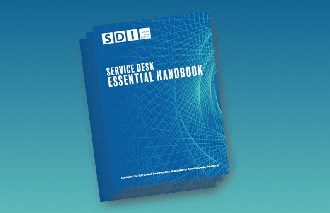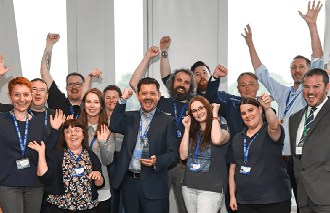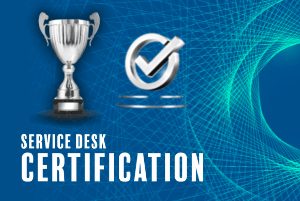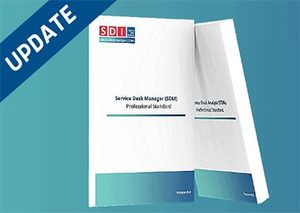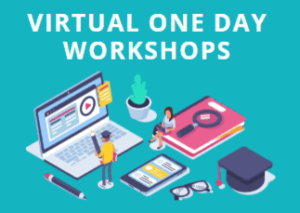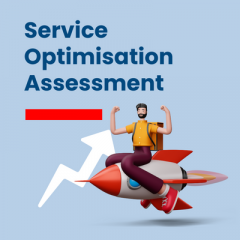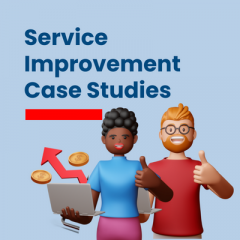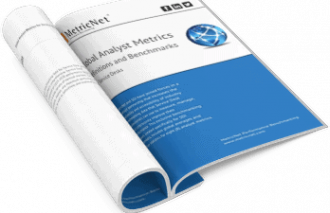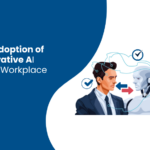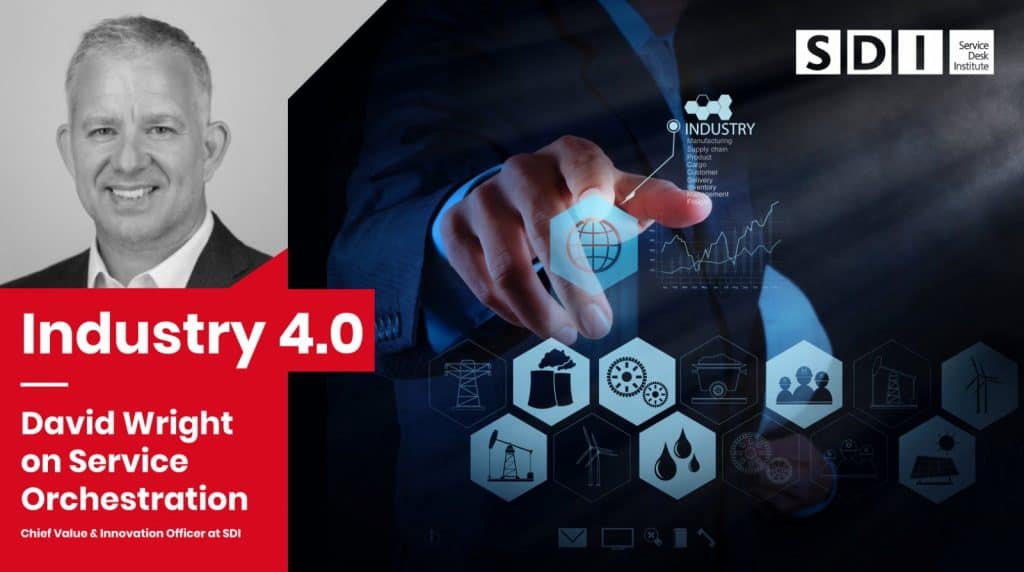
Industry 4.0 Series by David Wright, Chief Value and Innovation Officer, SDI
Wouldn’t it be incredible if…
-
IT operations could predict the next big infrastructure outage
-
The service desk could predict which end users will have a poor customer experience
-
IT could put steps in place to remediate them before they even happened
Well these outcomes may not be as incredible as they sound.
The Fourth Industrial Revolution
The service desk exists, in its current form, in a very cost conscious age, and many would argue, rightly so. 25% of IT budgets are spent on running IT operations and over £400 billion is attributed to losses through IT downtime. The most time spent by IT operations sees its ‘congregation’ languishing in the temple of the reactive, working harder rather than smarter, 24/7, to keep the wolves from the door.
Shouldn’t IT rather be dismantling the ineffective and inefficient to create more time to invest in the faith of the proactive? In many cases, the long-suffering consumer of IT services doesn’t see or feel service, just transactions, as they listen to IT say ‘no, I can’t because’ again. The cries of ‘we can’t be proactive when work gets in the way’, resound around the olde IT department right? But are things changing?
Well the obvious and simple answer is yes. The push to ‘do more with less’, the call from governments for increased productivity and the relentless focus on staying competitive are all converging with exponential changes in technology; new capabilities, new solutions and services to forge hybrid, augmented and orchestrated service propositions that are catapulting us into the 4th industrial revolution.
Productivity as a service is more real than it has ever been and the power of technology’s ability to enable is again at work. Potentially that enabling impact is more powerful and far reaching than it’s ever been. In fact, technology as an enabler is more powerful than the impact of the wheel and how it enabled our species to do more, be more agile and work smarter. More powerful even than the last industrial revolution which propelled our species into a ‘more with less’ automated future like never before. Through service automation, machine learning and artificial intelligence, the door to the near future is no longer ajar. It’s very much open. So how on earth does that reactive, ineffective, legacy thing that IT people currently call ‘work’ become the proactive, effective new world of service-centric experience?
Change Is Ahead
During the next few years, IT operations and IT service management are careering head long into the most significant change that they may have ever encountered. This change is driven by changing technology capabilities, the adoption of these capabilities in service delivery and, as many consumers of IT services would elude to, the frustration that current IT service management practices impinge on the ability of an organisation to innovate. Things are changing fast and will continue to change as organisations restructure in order to adapt to new ways of bridging the canyon between reactive and proactive service.
On the whole, we’ve always looked at IT support as a combination of people and technology to fulfill the business processes needed to support an organisation and its customers. I think it’s fair to say that quite often organisations’ technology capabilities can’t be adapted or developed at the speed that the business requires. So, it utilises people to fill the gap between technology and process. In many cases in an IT service environment, people are simply filling gaps, just applying business rules and performing repetitive activities in order to fulfill a process. It could also be argued that IT finds it challenging to keep up with the ever-changing demands and requirements of an organisation. It could also be argued that organisations recognise that and employ people again to fill the gaps between the business requirements and what can be delivered by the technology capability in an organisation. Although that model has been sustainable in the past, the approach is slowly becoming antiquated out of date and may no longer meet the needs of life in the 21st century.
Orchestrating The Customer Experience
If technology could remove the need for people to fill the gap between technology and process, IT teams would be able to create the time cross functionally to really consider and orchestrate the customer experience. And let’s be blunt, IT generally isn’t great at customer experience. An event-based customer satisfaction survey is not a customer experience programme. Scheduling some customer service training at the service desk will not create and deliver a customer-centric service. It needs much, much more creativity and service orchestration right across the whole of the service ecosystem as opposed to the fool’s gold approach of target driven outcomes and success measured against the achievement of inane service level agreements. Service automation, machine learning, predictive prevention and assisted self-service will soon enable IT teams to work in new ways, utilising new skills development techniques and digital lifelong learning frameworks to enable them to constantly adapt to the ever-changing needs of an organisation, and the needs of its customers, as the rules change forever.
The Future of IT Support
The use of new approaches like artificial Intelligence for IT Operations or ‘AIOps’ is fast taking centre stage in the battle of what the future of IT support could look like.
AIOps refers to multi-layered technology platforms that automate and enhance IT operations by using analytics and machine learning to analyse data, collected from multiple resources across the enterprise, in order to automatically spot and react to issues in real time. This has the potential to move support models based on last century thinking through the stages of existing, to effective, to proactive and then to predictive service operations.
SDI continues to see some clear examples of organisations developing and introducing strategies to harness such new capabilities in the form of service bots, robotic process automation, virtual assistants and event-driven automation frameworks, all of which support the creation of proactive and predictive operations. It’s very interesting to see service desks starting to consider new kinds of KPIs as a result such as:
- targeting the deflection of 50% of incoming support workload through automation
- empowering service desk staff to explore how to deliver 20% service automation at the service desk
- targeting the introduction of artificially Intelligent user interfaces.
So What Is AI?
Now the use of the term artificial intelligence, for me personally, is a bit grey and woolly. Artificial intelligence conjures up all types of subjective thinking and feelings that send some people’s fight, flight or freeze responses into overdrive. Artificial intelligence in its current form is really about better decision making and is only as good as the data available and the algorithms that people create.
So, AI is actually more about algorithm intelligence: how good or bad people are at creating, developing and training algorithms to meet the needs of an organisation and how enabling the data and algorithms are within the context of the organisation’s needs.
Decision making needs data. You can’t decide to make the best decision without the right data to help make the decision, right? Data creates information which creates knowledge which in turn creates wisdom. Algorithms unlock the value of data, so without the right data that’s been well curated and has a service context wrapped around it, artificial Intelligence simply won’t deliver on its promise of the proactive, new world service potential.
Current platforms that support AIOps may have out of the box customisable algorithms, the ability to switch on and off algorithms, python libraries and the ability to add your own algorithms. But you still need data with service context as well as the skills to develop and train predictive algorithms to help to prevent outages or provide assisted deep dive investigation.
So what does the service desk need to understand, to help them understand, the potential transition from reactive to proactive in the new world?
Here are some thoughts:
-
- Organisations will soon be able to release themselves from the shackles of antiquated methodologies and frameworks to innovate rather than just concern themselves with trying to do the same stuff better. Innovation frameworks will support and help teams to develop softer skills and harder skills. These skills will support new ways of working where people use these skills in a modular fashion to create dynamic teams of superconductors who have the capacity to organically swarm to deal with the challenges of technology convergence, service augmentation and orchestration. This will create the conditions for digital business exchange, swapping old practices for new and bringing customer-centric service to life.
-
- New support channels are being developed to compliment the traditional support channels like voice, email and self-service. These new channels will be based around chat conversation as a user interface and have the potential to reduce the need for human intervention as software will be developed to provide consumers of IT services with a more effective way of brokering solutions.
-
- As a result, the traditional approach to service support in IT service operations will augment, proactively orchestrating service will become the norm rather than reacting to failure.
-
- The support focus is moving to innovating and automating rather than firefighting, freeing up people to undertake more business value orientated workloads. The focus will shift away from break fix to upskilling and training software as well as the consumers of IT services. This shift will require new soft skills and harder skills. Digital lifelong learning strategies will evolve to meet the continual change and demands that artificial intelligence and service orchestration brings an organisation. The subject matter expert will become a thing of the past.
-
- Artificial intelligence is supported by a data pipeline and not just algorithms alone. Cleaning data and transforming data to create service context, will be an extremely important factor and where most time will be initially spent when developing an orchestrated service.
- Organisations may need to define how they get the most out of their data. Old world data management may have created silos of data sets located in different places and different environments across the enterprise. Understanding where is your data is, how you turn it into usable 21st century data and how it will actually be used is a critical consideration.
Simply getting better at the same stuff won’t be good enough any more. Dismantling old world systems to focus on innovation over incremental improvement may become a preferred approach for many organisations.
Brave New World
Artificial intelligence and automation helps remove operational and service effecting bottlenecks that organisations weren’t able to fix before. It’ll be about creating a world-class service experience for you, your organisation’s citizens and your organisation’s customers rather than arguing over process adherence or the validity of what performance metrics are SMART or not.
People will scoff at the fad of artificial intelligence and machine learning and attempt to reason that current methodologies and frameworks will prevail in the IT service battle of the future. The same way that luddites continued to extol the virtues of pre-industrial practices during the last industrial revolution. Some people will try to drag the future back to the here and now and try and control the status quo as they would like to see it. But as the new world takes over, these people’s thoughts and practices will ultimately become redundant.
Watch David Wright in a webinar on Service Automation recorded on 24 May at 10am EST/3pm BST.
